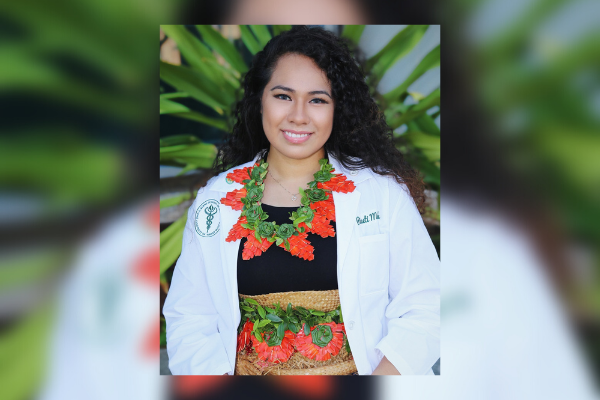
Growing up, MS 2024 candidate Piueti Maka didn’t have any role models in the medical field. Without any healthcare workers in her family to look up to, the idea of becoming a physician herself was not exactly on her radar. Her interest in the medical field was actually sparked by her father, who Maka credited for ‘planting the seed of medicine’ in her head. Her dad, whose family is from Tonga, pointed out to her that healthcare was something that not everyone from their small island nation had access to.
“He was the one who opened my eyes,” Maka said. “He told me, ‘We don’t have this in our country’ or ‘We don’t have this available to our people.’ I think that’s where I started thinking about healthcare, and it grew from there. My dad was a big part of that.”
She described her parents as hard workers who instilled the same work ethic in her growing up. Her father worked in construction to put her through school, as she moved from Sacred Hearts Academy, Kalani High School, and finally graduated from Punahou School. This work ethic followed her as she moved to the mainland to attend Pepperdine University for her undergraduate education. To help her make ends meet throughout college, she worked a number of jobs such as modeling, retail, and construction, just like her father.
“The only place that made sense”
After graduating from Pepperdine with a BA in Biology, Maka moved back to Hawaiʻi and took a few gap years before she was accepted into the ʻImi Hoʻōla post-baccalaureate program at the University of Hawaiʻi John A. Burns School of Medicine (UH JABSOM) in 2019. While she described the yearlong “medical school bootcamp” preparation program as incredibly intensive, Maka remembers being happy, excited and relieved when she received her acceptance letter to JABSOM alongside her ʻImi classmates.
For Maka, attending JABSOM was “the only place that made sense” to her. It was important for her as a Pacific Islander to be in and serve a community she wants to surround herself with, especially her fellow Polynesian people. She also acknowledges the efforts the medical school makes in educating their students on the cultures of the Pacific Islands, which is significant to her.
Even though serving the Polynesian community was important to her, Maka didn’t truly know the impact of being a Pacific Islander in medicine until she started her rounds in the hospital setting. There, she met many patients who were either Tongan or of Polynesian background. In this environment, not only was she able to learn what she needed to for school, she was also able to help the physicians at the hospitals understand their Polynesian patients even more.
“It’s been helpful for the physicians to learn more about the patient…and understand why certain things are so important to patients that they normally wouldn’t have shared with their physician,” she explained. “That’s the value I’ve been seeing as a Tongan woman in medicine. They’re just looking for people to relate to.”
“It’s Okay to Struggle”
Being one of, if not the only Tongan medical students at JABSOM can be tough, but it has not discouraged Maka. If anything, it has only encouraged her to reach out to other Pacific Islanders who are in the same situation. By a stroke of fate, Maka was introduced to Pasifikas in Medicine, an organization started by two Pacific Islander medical students in Arizona. The organization was initially started to help other Pacific Islanders, or Pasifikas, to network and connect, while also helping pre-med Pasifikas navigate their own medical journeys. Maka has not only been working on Pasifikas in Medicine’s social media and website. She has been busy doing outreach to find more potential members, as well as getting funds and scholarships for the organization. She hopes the funding will help alleviate the costs of resources, like books and tests.
For Maka, the idea of a new generation of Pacific Islanders in medicine is enlightening, but she is also aware that the road can also be very difficult for most people in her community. Despite that, she believes that Pacific Islanders should not be discouraged by that.
“It’s okay to struggle,” she said. “Weʻve all been through it before…there’s this idea that we shouldn’t put ourselves through any more struggle.”
She acknowledges that the struggle can range from financial to emotional. While she knows that being a Pacific Islander currently in medical school is inspirational to the youth in her community, she also knows that she can do more to inspire more people of her background to pursue medicine.
“I think all of those [struggles] just really sets you up for a better future,” she said. “It just takes a lot more struggling in the beginning, but [in the end], it all pays off.”
“That’s the goal”
While she is still deciding on what practice of medicine to focus on in her career, Maka knows one thing for sure – she would like to work in her parents’ home country someday. She has been studying Tongan, her family’s native language, to prepare for her future plans.
“I try really hard to practice my native tongue because I want to be able to practice in Tonga one day,” she said. “I don’t know if it’s possible to do my entire practice there, but definitely spend some summers there. The goal is to go back.”
Learn more about Pasifikas in Medicine here:
Pasifikas in Medicine website
Pasifikas in Medicine Facebook
Pasifikas in Medicine Instagram
Watch our profile on Piueti on YouTube: